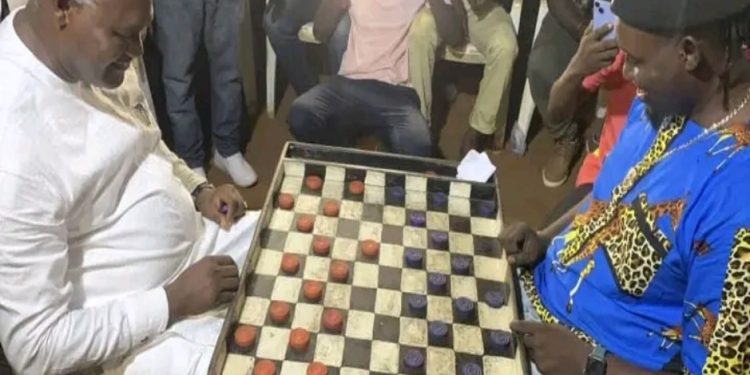By Hassan Osman Kargbo
In a heartwarming demonstration of humility and commitment to social change, Joseph Fitzgerald Kamara (JFK) visited the Common View Ataya Base, a popular gathering spot for youth in the East End of Freetown.
Located at Haja Fatmata, Wellington, the Ataya Base is known as a casual space where young people come together to socialize, engage in discussions, and partake in recreational activities. JFK’s visit to this informal, grassroots venue was a rare and touching moment, showcasing his dedication to engaging with the community on a personal level.
JFK’s decision to visit the Ataya Base marked a unique and memorable occasion. It was not only an opportunity for the youth to interact with a prominent figure but also a demonstration of JFK’s genuine desire to understand the lives and concerns of ordinary citizens. While many political and social leaders tend to remain distant from grassroots settings, JFK broke down these barriers and proved that leadership should be rooted in accessibility and connection.
During his visit, JFK spent time mingling with the youth and learning about their aspirations, challenges, and hopes for the future. However, what truly stood out was his participation in a game of draught, a popular pastime at the Ataya Base. Such a seemingly simple act of joining in a game with the young men present was loaded with significance. It was a gesture of solidarity and camaraderie that underscored his desire to connect with the youth beyond formal meetings or speeches.
In a society where there is often a clear divide between those in power and the general populace, especially in informal settings, JFK’s decision to engage in such a casual and down-to-earth activity sent a powerful message. By joining in their everyday activities, he showed the young people that their lives, perspectives, and cultures matter.
JFK made it clear that leadership isn’t just about making decisions from afar but about engaging with the people one serves, understanding their concerns, and building relationships based on mutual respect and understanding.
The youth at the Common View Ataya Base were visibly appreciative of JFK’s visit and the authenticity with which he approached their gathering. Many expressed how refreshing it was to see someone of his social standing take the time to visit their space, interact with them as equals, and engage in activities that brought them joy.
In a conversation with some of the young men, one noted, “JFK’s visit is a sign that he truly cares about us. He didn’t just come to talk to us from a distance; he joined in with us, played a game, and listened to what we had to say. That means a lot.”
JFK’s visit was not only about personal interaction but also about sending a broader message: true leadership is about inclusivity, understanding, and engaging with people from all walks of life. By immersing himself in the daily lives of the youth at the Ataya Base, JFK showed that he values them as integral members of society who deserve attention, support, and respect.
This visit also highlights the growing need for leaders to step out of their formal settings and engage directly with the people they serve. It’s easy for leaders to lose touch with the realities of the everyday citizen when they are confined to boardrooms or official events. However, JFK’s visit proved that real change starts when leaders make the conscious effort to connect with people on a human level, understanding their needs, and building trust.
As the visit concluded, the youth at the Ataya Base were energized and inspired by JFK’s presence. His willingness to engage with them in such an intimate, personal manner has left a lasting impression, reinforcing the belief that community-building and social change begin with one simple act of reaching out and connecting with others.
For JFK, the visit was a testament to his belief that leadership is about people, not positions; and that by listening, understanding, and actively participating, positive change is not only possible—it is inevitable.











